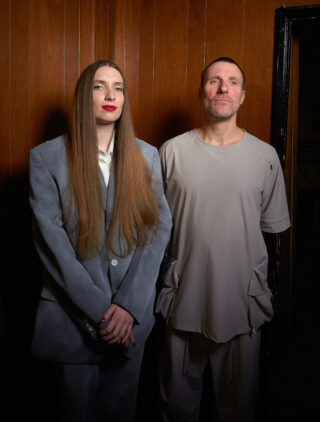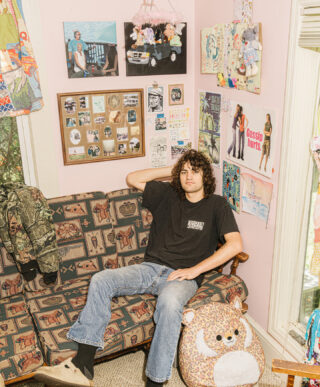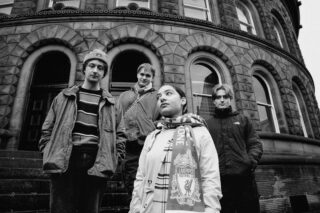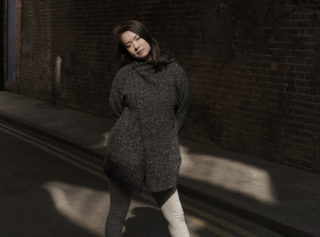
All wrapped up in a blanket scarf and with her shoulders hunched to fend off London’s April chill, Mitski Miyawaki is tired. It seems a perennial problem for the 25-year-old, who regularly tweets in the middle of the night lamenting her brain’s nocturnal alertness when all around her the population slumbers and snores. While I boast, a little insensitively, of my own regular 8-hour appointments with the Sandman, she describes a cycle that typically involves a short-lived fit of sleep around midnight followed by a rhythm of tosses, turns and half-dozes before settling into a few snatched hours as the morning comes around and the rest of the world gets ready for the day ahead. At one point, she says, it was even more of a struggle. “When it was three hours, I was waiting tables all day – for twelve hours – and then I would do whatever music thing I could fit in after that.”
It’s a wonder, then, that she gets anything done. For she certainly gets things done. Her fourth album in five years, ‘Puberty 2’, is by far the most ambitious project to date for the artist known simply by her given name. Though the song writing on the first three LPs was of a consistently high standard, it always felt like Miyawaki was constrained, and while 2012’s ‘Lush’ and its follow-up, 2013’s wonderfully named ‘Retired from Sad, New Career in Business’, hinted at sounds fashioned out of raw materials beyond the indie rock, with their pianos and strings you sensed that there was more to come, a wider palette to be experimented with. And this time she has mined a new quarry altogether. It’s all the more impressive for her serial lack of rest, though she says she’s just become clever about how she uses her dwindling pool of reserves. “I have no energy, it’s just that I’m very good at rationing it. I have no social life, I don’t have fun – ever – it’s just all work.”
The production, crucially, has slid up a gear. Under the watchful eye of trusted long-time collaborator Patrick Hyland, ‘Puberty 2’ boldly breaks out of prescribed structures through skilful, confident sleights of hand that just wouldn’t be possible with solely acoustic instrumentation. From the first machine gun synthesised drum stabs of opener, ‘Happy’, you know you’re in for a more interesting – if a little bumpier – ride this time around.
Stylistically, it is also Mitski’s most varied work. Impressively blending a range of ostensibly disparate genres, from trip hop to new wave via punk and electropop, it’s a beautiful tapestry that works as a whole despite the seeming incongruence of its parts. One minute it recalls the early 2000s indie rock of Grandaddy (‘Dan The Dancer’) or the neo-grunge Waxahatchee (‘Fireworks’, ‘My Body’s Made Of Crushed Little Stars’) and the next it’s all smart eighties slow jams (‘Thursday Girl’) and dreamy synths that would have psychedelic tears dripping down Robin Guthrie’s wee cheeks (‘I Bet On Losing Dogs’).
It all arises from a growing confidence in her own abilities and a newly found disregard for reproducing the songs on stage that have given Miyawaki the freedom to evolve. “For the last album [2014’s breakthrough ‘Bury Me At Makeout Creek’] I was very conscious of being able to recreate the songs live,” she admits. “And my live situation was very lo-fi, where I would either have one guitar in a basement or a three-piece band in a basement. So I wrote songs that would translate well to that environment.” She is clearly excited by this fresh brashness. “For this record I wasn’t so concerned about playing it live because I realised that I could just have a different live version. I just wanted the record to sound good, to go into the studio and do what served each song regardless of how I would play it later, live.”
But while the fruits of those toils are hard won, Mitski is evasive when it comes to the album’s title. There was no ‘Puberty 1,’ of course, and so I ask if it is intended to hint at a sequel to or reflection on the changes she went through in her teenage years while she now goes through the metamorphosis of her twenties. “Most things that are important, I deliberately don’t think about,” she states cryptically with a look that says she wouldn’t tell me anyway. “So maybe it has loads of meaning and that’s why I gravitated towards it, but how it happened was that me and the producer were just riffing on what the album title should be, just joking around and I latched on to it.” She pauses. “Maybe I latched on to it for deeper meanings but I try not to get too existential!”
Born in Japan to a Japanese mother, a lot is made of Miyawaki’s heritage as journalists scramble to label her work as flowing seamlessly from her background. In interviews and reviews she is almost always described as Asian or Asian-American before any mention of her music. It’s something that understandably grates. “It’s like racism masked in progressive thought,” she says. “At the end of the day, therefore, I’m not a person. I’m a symbol. And then people start talking about how I’m not representing it properly.” She rolls her eyes and sighs, her articulateness making it obvious that she’s thought hard about her stance on the issue. “Sometimes it’s helpful when there are other East Asian girls who message me and they say, ‘Oh my gosh, there aren’t any other East Asian women. I didn’t realise I was missing that figure until I saw you.’ That’s always encouraging.” Having self-identified as a feminist from early on, she has also found that people assume every song is written from that perspective and with a feminist thesis at its core from the poet laureate of Asian(-American) females. “I’m not writing as an Asian woman,” she says, “I’m writing as a person. I’m not making music to be a politician and I’m kind of being dressed up as that.”
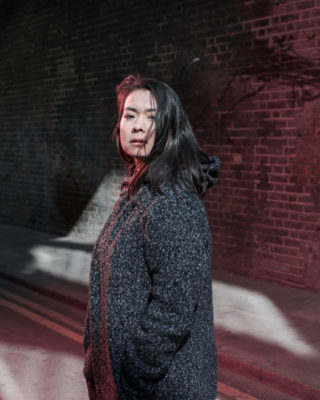
Rather than simply an Asian female, then, Mitski sees her identity as much more complex. She’s spent chunks of her life living in China, the Congo, Turkey and various parts of the United States. Although it should be pointed out that that Japanese passport didn’t come easy. I ask about her childhood and she pauses and smiles before recounting the story of her birth. When Mitski was just about ready to come out into the world, her mother flew to her native Japan in a rush to secure citizenship. “My mother… crazy. It was crazy of her to do that, to carry an unborn child in her stomach while she’s travelling from Africa to Japan, give birth, fly back to Africa.” So rushed was the task that she nearly emerged mid-flight. “I was almost born in the plane, according to my mother. Although I don’t know how accurate that was! And then, once she’d recovered, we just went back.” The wistfulness that runs through her songs, she says, is a direct result of that peripatetic life. “It’s shaped my identity at my core and that informs my music,” she tells me. “A lot of it is to do with leaving – saying goodbye – and going to a new place and not belonging. I think those are big themes in my music, objectively!” Who needs critics when you can write your own reviews?
It’s that sense of longing that functions as the thread running through Mitski’s work, tying together all of those genres so beautifully. For as well as a longing to be somewhere else, so many of her songs are born out of a longing for someone else. At every turn there are broken relationships. Some have faded, some have burned out brightly but she’s yet to write a song with the happy ending she so craves. She admits that in her formative years she sought out these experiences, saying: “When I was a teenager it was all about experiencing everything. I was a junkie for emotion and I wanted it all.” Now, however, she just wants a relationship that works within a life that works. “Lately I’ve found that I just want to be happy. You get a little older and you just get tired. So maybe when I was younger I chased that and sometimes I would do it for the song. I’ve had a lot of relationships where I knew from the start… I was like, ‘Oh, this is so juicy. This is gonna hurt!’” She rubs her hands in mock delight. “Now I just don’t have the time or energy. Honestly, if I could give all of this away for happiness, I would. I would rather be boring and happy than be fucked up and – apparently – a good artist.” Feeling that it would be impolite not to, I offer my sincere thanks and she beams. “You’re welcome!”
As well as dealing with an external world that loves to foist their own ideas of identity upon her, Mitski has also struggled to keep a handle on where her public persona ends and her private sphere begins, as fans and critics alike presume they know the woman behind the music. Where once only friends sought to empathise or share in her life narrative, now members of the public take it upon themselves to get involved, even when it’s far from appropriate. For a while, this affected her work as she tried to second-guess what her audience wanted from her. “There was a period where I thought it paralysed me,” she says. Luckily, she was able to seize back the reins. “The world kind of disappears. When I write I’m not thinking of anyone but myself. I am the protagonist, I’m the drama queen,” she laughs. “It’s all about me.”
Unfortunately, while she manages to keep her art separate, this intrusion has disturbed her on a personal level. “I think it does affect me in my day-to-day,” she says. “It’s quite sad – maybe I turn everything into a sad thing – but what I’ve noticed is that so many people think that they know me now. It’s very weird because they don’t, and what’s paralysing is getting messages or emails from people I’ve never met acting like they’re my best friend or expecting me to do things for them. I’ve had people say, ‘So, my mother is in the hospital and she has cancer. Can you please come visit her?’ That’s been paralysing.”
Sadly it’s part and parcel of a career that has been quietly ramping up and looks set to take off in earnest in 2016. Miyawaki, however, has a very different idea of what accomplishment looks like. It certainly doesn’t involve selling thousands of records, and it isn’t dictated by her bank balance. “I don’t think I’ll be successful this year because what I see as success has nothing to do with material shit. I want freedom; the freedom to do as I please and be left alone, finally.” The ‘finally’ is telling, more than hinting at the struggles she goes through for her art, and the many voices that surround her in her day job. “I think I’m working this hard so that maybe in ten years I’ll be left alone to just make the music I want to make at my own pace. I think that’s very ambitious because no adult gets left to do what they want to do and my ultimate ambition is to do what I want to do, when I want to do it.”
We agree to check in in 2026, and I remind her of a smaller ambition, namely a recent tweet where she said that all she wanted was a permanent place to live. As though she’d forgotten all about it, discounting such a lofty goal as mere fantasy, her eyes light up at the prospect. “If I was concerned with material shit I would have a place to live by now, but yeah, I would like somewhere to go back to!”




